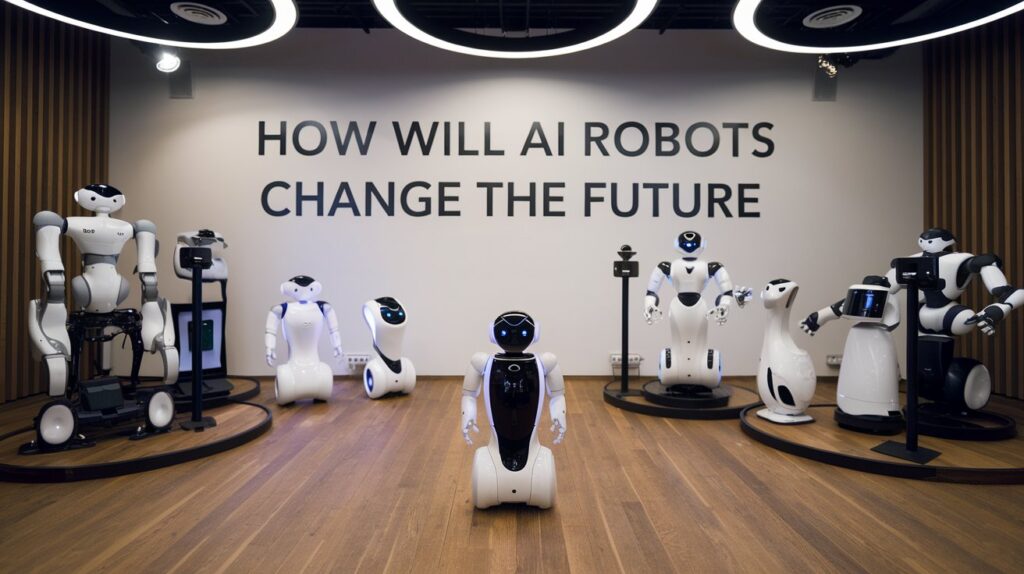What Is a Autonomous AI Agent and How They Will Change the Future

In this era of technological advancement, the concept of autonomous AI agents has captured the attention of industries and researchers alike. These agents, equipped with the ability to learn and adapt, are poised to revolutionize the way we accomplish tasks and make decisions.
But what exactly is an autonomous AI agent, and how will it shape the future? By harnessing the power of AI technologies, these sophisticated programs can comprehend and process human-like prompts, enabling them to perform intricate actions independently.

The potential benefits they offer, such as streamlined processes, expedited problem-solving, and augmented human capabilities, are tantalizing glimpses into a future where efficiency and innovation reign supreme.
As we embark on this exploration of autonomous AI agents, we will uncover their definition, characteristics, applications in various industries, advantages, ethical considerations, and the profound implications they hold for the future.
Definition and Characteristics
Autonomous AI agents are self-directed entities with advanced AI capabilities that enable them to perceive their environment, make independent decisions, and take actions to achieve their goals. These agents are designed to handle a wide range of tasks without constant human intervention, making them highly efficient and effective.
Equipped with advanced AI technologies, such as GPT models, autonomous AI agents possess the ability to understand and process human-like prompts, allowing them to perform complex actions and operations beyond mere text generation.
The transformative potential of autonomous AI agents lies in their capacity to change the future by streamlining tasks, aiding in decision-making, and providing valuable assistance across various domains. Unlike traditional AI systems, autonomous agents are capable of setting their own goals and devising strategies to achieve them. They gather information from their environment using the internet or sensors and cameras, continuously learning from their experiences and refining their decision-making processes. This adaptability allows them to navigate changing circumstances and make informed choices.
With their autonomy and advanced AI capabilities, autonomous AI agents have the potential to revolutionize various industries and domains. From healthcare and finance to manufacturing and logistics, these agents can optimize processes, improve efficiency, and enhance decision-making. The transformative potential of autonomous AI agents is vast, promising a future where tasks are automated, human effort is augmented, and the boundaries of what is possible are expanded.
Applications in Industries
The transformative potential of autonomous AI agents extends to various industries, where they have found numerous applications that revolutionize processes and enhance efficiency. These agents have the capability to perform complex tasks and achieve specific goals, making them invaluable in a wide range of industries.
In the field of robotics and automation, autonomous AI agents are powering robots in manufacturing, logistics, and healthcare. These agents enable robots to autonomously perform tasks that were previously done by humans, such as assembly line operations, inventory management, and patient care. This not only increases productivity but also reduces the risk of human error.
Another area where autonomous AI agents are making a significant impact is in cybersecurity. These agents can detect and respond to cyber threats in real-time, protecting networks and systems from attacks. Their ability to continuously monitor and analyze vast amounts of data makes them an essential tool in safeguarding sensitive information.
Self-driving cars are another industry where autonomous AI agents are transforming the way we travel. These agents navigate roads, perceive surroundings, and make driving decisions, enabling autonomous vehicles to safely transport passengers.
In the financial trading industry, autonomous AI agents are being used to analyze market data, identify patterns, and execute trades autonomously. These agents can optimize investment strategies by leveraging their ability to process large amounts of data and make informed decisions in real-time.
Furthermore, in the field of AI software development, autonomous AI agents are being utilized as one-person teams. These agents take on roles such as Chief Technology Officers, Program Managers, and Developers, streamlining the development process and enhancing efficiency.
Advantages and Benefits
With their ability to automate complex tasks and drive efficiency gains, autonomous AI agents offer a range of advantages and benefits in various industries. These agents, powered by advanced AI technologies such as GPT models, possess the capacity to learn, adapt, and perform tasks without constant human intervention.
Here are some of the advantages and benefits of autonomous AI agents:
- Increased Efficiency: Autonomous AI agents automate complex tasks, freeing up human time and effort for more creative and strategic endeavors. This leads to increased productivity and overall operational efficiency.
- Continuous Optimization: One of the key advantages of autonomous AI agents is their ability to learn and adapt. Through continuous optimization, these agents can improve their performance over time, driving efficiency gains across various industries.
- Personalization and Assistance: Autonomous AI agents can personalize experiences and provide valuable assistance in various domains. From customer service to healthcare, these agents have the ability to understand and cater to individual needs, enhancing user satisfaction.
- Data Analysis and Insights: With the ability to analyze vast amounts of data, autonomous AI agents can uncover hidden patterns and insights. This enables organizations to make data-driven decisions, fueling innovation and driving business growth.
Ethical Considerations
Having outlined the advantages and benefits of autonomous AI agents in various industries, it is imperative to address the ethical considerations associated with their development and deployment.
As autonomous AI agents continue to evolve and become more sophisticated, enabling them to perform complex tasks and make independent decisions, it is essential to establish ethical guidelines to govern their behavior and decision-making processes.
One of the key ethical considerations is the potential for bias in the algorithms that power autonomous AI agents. These algorithms are trained on vast amounts of data, and if the data itself is biased, it can lead to biased decision-making by the agents. Addressing this issue requires careful data selection and preprocessing, as well as ongoing monitoring and auditing to ensure fairness and mitigate any biases that may arise.
Privacy is another critical ethical concern. Autonomous AI agents have access to vast amounts of data, and it is crucial to ensure that this data is handled in a secure and responsible manner. Strict protocols should be in place to protect user privacy and prevent unauthorized access or misuse of personal information.
Transparency and accountability are also important ethical considerations. Users should have visibility into how autonomous AI agents make decisions, and there should be mechanisms in place to address any errors or biases that may occur. Additionally, the responsibility for the actions of autonomous AI agents should be clearly defined, ensuring that there is accountability for any negative consequences that may arise from their use.
Future Implications
Autonomous AI agents are poised to revolutionize industries and redefine the way work is performed in the future. These advanced AI technologies have the potential to create significant implications for the future. Here are some key future implications of autonomous AI agents:
- Revolutionizing Industries: The widespread adoption of autonomous AI agents is expected to revolutionize industries by improving efficiency and productivity. These agents can automate repetitive tasks, optimize processes, and enable real-time decision-making, leading to increased productivity and cost savings.
- Redefining Work: Autonomous AI agents have the potential to redefine the way work is performed. They can handle complex tasks without constant human intervention, freeing up human resources to focus on more critical and creative aspects of work. This will create new job roles that involve collaborating with and managing autonomous AI agents.
- Ethical Considerations and Regulations: As autonomous AI agents become more prevalent, ethical considerations and regulations will need to be developed to ensure their responsible and safe use. Issues such as data privacy, bias, and accountability need to be addressed to prevent potential misuse or harm caused by these agents.
- Continued Advancements: The future of autonomous AI agents holds immense potential for innovation and convenience. Continued advancements in AI technology will further enhance the capabilities and impact of these agents. They will become even more intelligent, adaptive, and capable of handling complex tasks, leading to a new era of AI revolution.
The future implications of autonomous AI agents are vast. They have the potential to transform industries, redefine work, and create new job roles. However, it is crucial to address ethical considerations and regulations to ensure responsible and safe use of these advanced AI technologies. Continued advancements in AI will further enhance the capabilities and impact of autonomous AI agents, leading to a future that is shaped by the AI revolution.

Frequently Asked Questions
What Is the Future of Autonomous Agents?
The future of autonomous agents holds great potential for revolutionizing industries, creating new job roles, and reshaping work processes. These AI-powered entities can automate complex tasks, personalize experiences, and provide valuable assistance across various domains, driving innovation and societal transformation.
What Is an Autonomous AI Agent?
An autonomous AI agent is a self-directed program that can perceive its environment, make decisions, and take actions independently. It has the potential to automate complex tasks and transform industries by leveraging advanced AI technologies.
What Is Autonomous Ai?
Autonomous AI refers to AI systems that can operate independently, perceiving their environment and making decisions. These agents utilize advanced AI technologies and have the potential to revolutionize industries, improve productivity, and create new job roles.
What Are the Applications of Autonomous Agents in Real World?
Autonomous AI agents have diverse applications in the real world, such as automating complex tasks in industries, powering robots, detecting and responding to cyber threats, navigating autonomous vehicles, and optimizing investment strategies through market analysis and trade execution.
Conclusion
In conclusion, autonomous AI agents are sophisticated programs that have the potential to revolutionize various industries by streamlining tasks, facilitating decision-making, and augmenting human capabilities.
With their ability to learn, adapt, and accomplish tasks independently, these agents can optimize processes, expedite problem-solving, and enhance overall efficiency.
However, ethical considerations must be addressed to ensure responsible and unbiased use of these agents.
As we move forward, the impact of autonomous AI agents is expected to be far-reaching, leading to enhanced productivity and innovation across sectors.







You’ve made some really good points there. I looked on the internet
for more information about the issue and found most people will
go along with your views on this website.
Thank you, Melinda, for your insightful comment and valuable feedback.